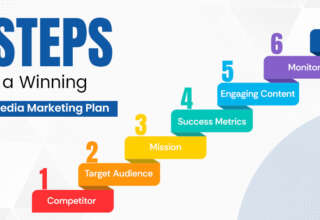
Out of all the different traffic sources, social media and organic search traffic are two of the best ones, and generally drive the most traffic to websites. The issue is that not every marketer or business has the resources to focus on both channels.
So which one is the better option? In this post, we’ll look at the two with an analytical eye, in order to determine which one is the best traffic source.
Social media vs. SEO: the numbers
Social media traffic has been growing year by year, and while there have been periods where it seemed to stagnate, overall, it’s now become the top source of all website referral traffic.
But those are general figures – which is the top driver of your referral traffic might actually be different.
This is ‘why it’s difficult to specify a definitive winner in social vs SEO race – the stats change significantly depending on who’s conducting the research, and which website, specifically, your’e referring to.
The final winner for you, therefore, may be different, but let’s weigh up the potential benefits of each.
Social media: the up-sides and down-sides
One of the best parts about using social media marketing to drive more traffic to your website, is that you get quite a few other side benefits. For example, being active on social helps improve brand awareness, building trust and loyalty, and it’s great for driving more engagement and for managing customer service.
Another big benefit to using social media is that it can help you gain more influence, as well as grow your business across board. And although social media has little direct influence over your search engine ranking, it can help your SEO, albeit indirectly. By helping to grow your business and your website, gaining more traffic, more backlinks and so on, this will improve your website’s domain authority, and thus, its search engine ranking by extension.
Another key consideration is that social platforms have become search engines within themselves. Just look at Twitter, for example – you can use it to see what the biggest trending news of the day are and you can easily search for great content. You can search based on your location, in different languages and if you click on advanced search, there are even more options:

One of the things that makes social media a bit more attractive than search engine optimization is that you get to maintain a bit more control over your success. You can always find new ways of improving your strategy and you can learn from your mistakes and your wins so that you can improve your traffic in the future. The same can’t really be said about SEO – although it’s very clear what not to do, it’s not always as clear exactly what strategies can help you improve your ranking.
There are also no changes in algorithms that will completely destroy your strategy – which, unfortunately, happens all too often with search engines. That said, Facebook has certainly made quite a few algorithm changes over the years which have affected businesses negatively – it’s a constant struggle to get your posts on your fans’ news feeds.
In terms of down-sides with using social media for traffic, it can take some time to get it right and to build a big enough audience; although, the same can definitely be said about SEO, which can take even longer to build up.
The competition is fierce on social media – there are numerous other profiles just like yours, sharing similar content and sharing the same audiences. It’s difficult to make your content stand out and to get good, quality traffic consistently.
SEO: the up-sides and the down-sides
Just like with social media marketing, SEO has quite a few benefits beyond being a traffic source. For example, it’s great for brand awareness (so long as you can get in the top results), and it can help you create a better website for your readers, as usability and readability is important to search engines.
SEO also helps build trust with audiences as your website’s domain authority grows. Not only that, but a high domain authority can bring in lots of new opportunities.
Search engine traffic can also be very targeted, and it can get you more high-quality traffic than social media – but, again, this depends quite a bit on your actual search ranking.
Another benefit to SEO is that your results are easy to measure and quantify – but, the downside is that it’s not as easy to figure out exactly how much money SEO is actually bringing in.
As I mentioned earlier, one of the biggest downsides to SEO is that Google is constantly making changes to their algorithm; they come out of nowhere, and they can drop your domain authority by 5, 10, even 15 points and it almost feels like you need to start optimizing all over again. It’s frustrating, it’s hard work and the results aren’t always visible – but if you can get SEO right, it can truly be an amazing source of traffic.
Social media vs. SEO: the verdict
This is a very difficult decision to make; the truth is, you need both in order to truly grow and scale your business. But at the same time social media, in my experience, has a few more benefits up its sleeve than SEO does.
The answer to this also depends a lot on varying factors that pertain to a particular, individual business. There’s no clear answer that works across board – different businesses have different needs, different approaches and so on.
The best place to start is to look at your own traffic to see what your current main traffic sources are.
But, even more important than that, look beyond the numbers and focus on the quality of your traffic. What’s the bounce rate like for social media vs. organic search traffic? How much time do the visitors from each source spend on your website? And most importantly, what’s your conversion rate like for each of the two traffic sources?
After all, no matter how much traffic you’re getting to your website, if that traffic doesn’t take some sort of action that moves them along the sales funnel, then it won’t help you achieve your overall business goals.
[Source:- Socialmediatoday]







